Related Research Articles
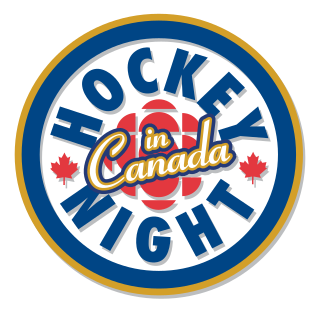
CBC Television has aired National Hockey League (NHL) broadcasts under the Hockey Night in Canada brand that is primarily associated with its Saturday night NHL broadcasts throughout its history in various platforms. The brand is owned by the CBC and was exclusively used by CBC Sports through the end of the 2013–14 NHL season.
The Sports Network (TSN) is a Canadian English language discretionary sports specialty channel owned by CTV Specialty Television, owned jointly by Bell Media (70%) and ESPN Inc. (30%), itself a subsidiary of The Walt Disney Company. TSN was established by the Labatt Brewing Company in 1984 as part of the first group of Canadian specialty cable channels. TSN is the largest specialty channel in Canada in terms of gross revenue, with a total of CA$400.4 million in revenue in 2013.
Sportsnet is a Canadian English-language discretionary sports specialty channel owned by Rogers Sports & Media. It was established in 1998 as CTV Sportsnet, a joint venture between CTV, Liberty Media, and Rogers Media. CTV parent Bell Globemedia then was required to divest its stake in the network following its 2001 acquisition of competing network TSN. Rogers then became the sole owner of Sportsnet in 2004 after it bought the remaining minority stake that was held by Fox.
The 1994–95 NHL season was the 78th regular season of the National Hockey League. The teams played a shortened season, due to a lockout of the players by the owners. In addition, the NHL All-Star Game, which had been scheduled to take place January 20–21, 1995, in San Jose, California, was canceled. San Jose was soon selected as the venue for the 1997 NHL All-Star Game. The New Jersey Devils swept the heavily favored Detroit Red Wings for their first Stanley Cup win. It was also their first appearance in the finals overall. This is also the first time in both NHL and NBA history where both finals involved a sweep. Both finals consist of the number one seeded team both being swept.
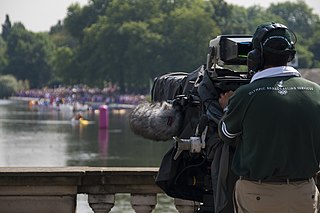
The broadcasting of sports events is the live coverage of sports as a television program, on radio, and other broadcasting media. It usually involves one and more sports commentators describing events as they happen.
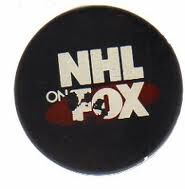
The NHL on Fox is the branding used for broadcasts of National Hockey League (NHL) games that were produced by Fox Sports and televised on the Fox network from the 1994–1995 NHL season until the 1998–1999 NHL season. NHL games continued to air on the Fox Sports Networks in the form of regional game telecasts until the 2021 rebrand to Bally Sports.
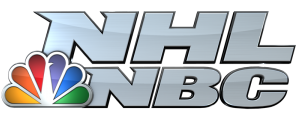
The NHL on NBC was an American presentation of National Hockey League (NHL) games produced by NBC Sports, and televised on NBC properties, including MSNBC, CNBC, Golf Channel, USA Network and NBCSN in the United States.

TSN Hockey is the blanket title used by TSN's broadcasts of the National Hockey League.
NHL on CTV is the name of a former television program that broadcast National Hockey League games on the CTV Television Network.
The National Hockey League has never fared as well on American television in comparison to the National Basketball Association, Major League Baseball, or the National Football League, although that has begun to change, with NBC's broadcasts of the final games of the 2009, 2010, 2011, and 2013 Stanley Cup Finals scoring some of the best ratings ever enjoyed by the sport on American television.
The National Hockey League (NHL), a professional ice hockey league active in the United States and Canada, is broadcast over the radio mainly in its participating countries.
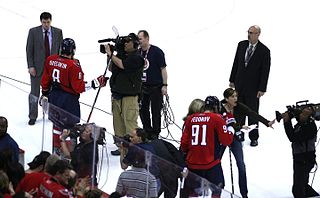
The National Hockey League (NHL) is shown on national television in the United States and Canada. With 25 teams in the U.S. and 7 in Canada, the NHL is the only one of the four major professional sports leagues in the United States and Canada that maintains separate national broadcasters in each country, each producing separate telecasts of a slate of regular season games, playoff games, and the Stanley Cup Finals.
From 1965 through 1975, in addition to the Saturday night game on CBC, Hockey Night in Canada also produced and broadcast a Wednesday night game on CTV, CBC's privately owned competitor; beginning in the 1975–76 NHL season, these midweek games began to broadcast by local stations. In 1970–71, the Vancouver Canucks joined the NHL, meaning that there were now three possible venues for an HNIC telecast.
During the 1979–80 and 1980–81 seasons, four more Canadian teams, the Edmonton Oilers, Quebec Nordiques, Winnipeg Jets, and Calgary Flames, joined the NHL. The Oilers and Flames were featured frequently as the two teams were contenders the 1980s; in contrast, as the Nordiques were owned by Carling-O'Keefe, a rival to the show's sponsor Molson and whose English-speaking fanbase was very small, the Nords were rarely broadcast, and never from Quebec City during the regular-season.
After Wayne Gretzky was traded to the Los Angeles Kings in 1988, CBC began showing occasional double-headers when Canadian teams visited Los Angeles to showcase the sport's most popular player. These games were often joined in progress, as the regular start time for Hockey Night in Canada was still 8 p.m. Eastern Time and the Kings home games began at 7:30 p.m. Pacific Time. Beginning in the 1995 season, weekly double-headers became permanent, with games starting at 7:30 Eastern and 7:30 Pacific, respectively. In 1998, the start times were moved ahead to 7 p.m. ET and PT.
Since 2000, the CBC has aired an annual special Hockey Day in Canada broadcast to celebrate the game in Canada. The broadcast includes hockey-related features all afternoon, leading up to a tripleheader of NHL action featuring the seven Canadian teams. One exception was the 2008 edition that featured four games including two American teams along with the six Canadian teams; this was due to the NHL's schedule format at the time, as there was no inter-conference games between Canadian teams. Lead commentators, Don Cherry and Ron MacLean broadcast from a remote area. The broadcast includes live broadcast segments from smaller communities right across the country and features panel discussions on issues facing "Canada's game" at both the minor and pro levels. The day is usually in mid-February, but was broadcast in early January in 2002 and 2006 due to the 2002 Winter Olympics and 2006 Winter Olympics, respectively; the 2007 event was also held in January, though no sporting events key to Canada were scheduled.
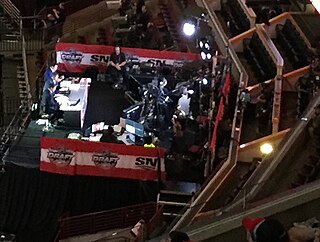
On April 19, 2011, after ESPN, Turner Sports, and Fox Sports placed bids, NBC Sports announced it had reached a ten-year extension to its U.S. television contract with the NHL worth nearly $2 billion over the tenure of the contract. The contract would cover games on both NBC and sister cable channel Versus, which became part of the NBC Sports family as the result of Versus parent Comcast's controlling purchase of NBC Universal earlier in 2011.
The National Hockey League (NHL) is shown on national television in the United States and Canada. With 25 teams in the U.S. and 7 in Canada, the NHL is the only one of the four major professional sports leagues in the United States and Canada that maintains separate national broadcasters in each country, each producing separate telecasts of a slate of regular season games, playoff games, and the Stanley Cup Finals.
References
- Kitchen, Paul (2008). Win, Tie, or Wrangle: The Inside Story of the Old Ottawa Senators - 1883–1935. Manotick, Ontario: Penumbra Press. ISBN 978-1-897323-46-5.
- ↑ Albert, Norman (February 9, 1923). "Conacher Scored Six for North Toronto". Toronto Star. p. 12.
- ↑ Kitchen, p.246
- ↑ "First Radio Broadcast Play-By-Play of Game". Winnipeg Free Press. February 23, 1923. p. 10.
- ↑ "First Televised Game". CBC. Retrieved 2009-10-05.
- ↑ NHL.com - The National Hockey League Web Site
- ↑ "ASN secures broadcast rights for Asia" . Retrieved 2008-09-25.[ dead link ]
- ↑ Foster Hewitt His Own Story by Foster Hewitt, The Ryerson Press, 1967 page 101
- ↑ "NHL back on ESPN with 7-year multiplatform deal". ESPN. March 10, 2021.
- ↑ "ESPN officially announces new TV deal with NHL, featuring 25 games on ABC or ESPN, 75 exclusive games on ESPN+ and Hulu, new studio show". Awful Announcing. March 10, 2021. Retrieved March 11, 2021.
- ↑ The Canadian Press - NHL signs European TV deal [ permanent dead link ]
- ↑ Sport Business - NHL ties up eastern European TV deals Archived 2006-12-20 at the Wayback Machine